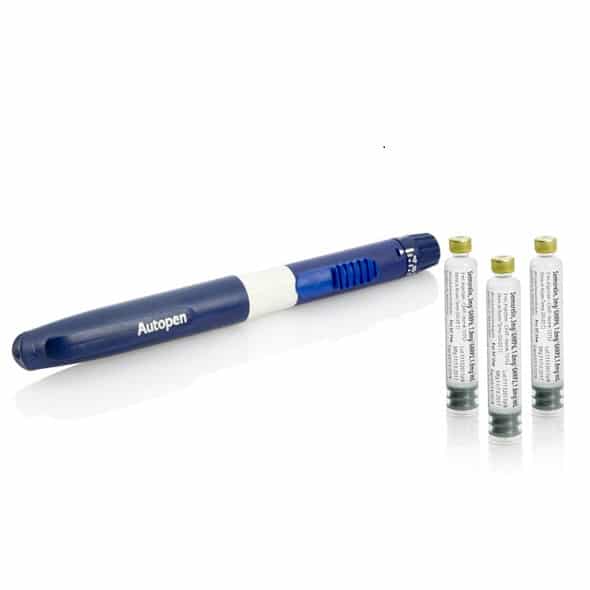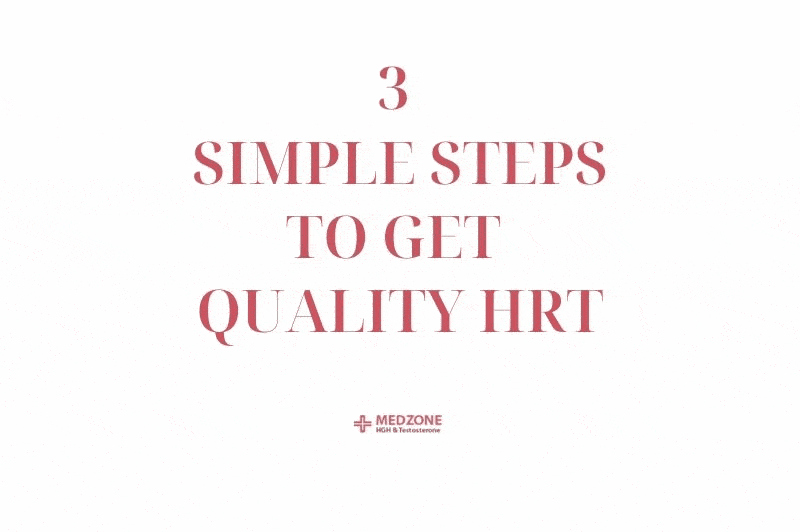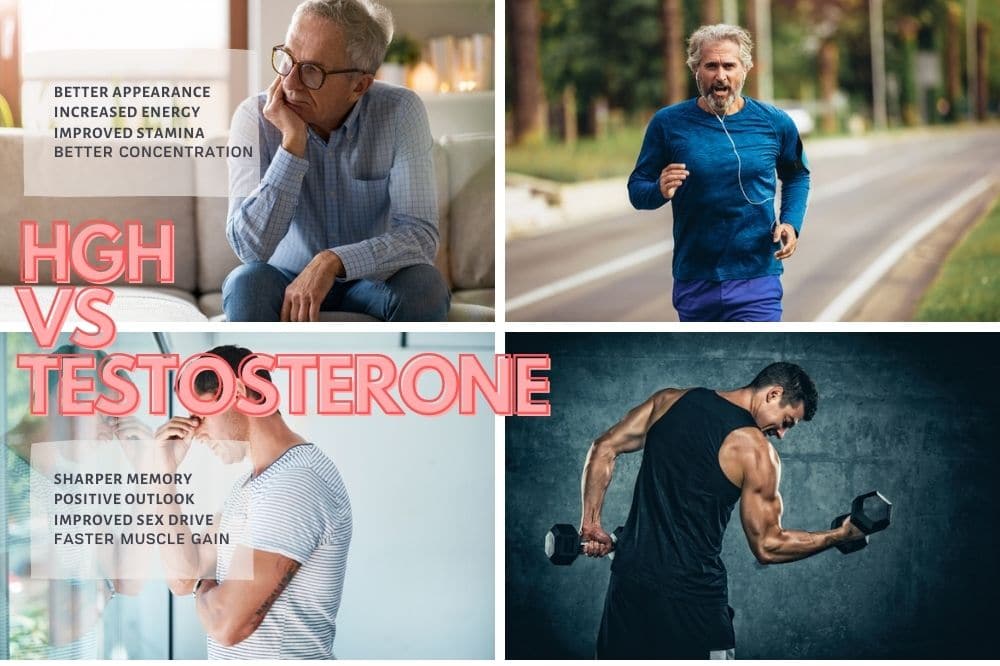
Growth Hormone vs Testosterone: What Are the Differences and What Are the Similarities?
Table of Contents
You have likely heard of testosterone and human growth hormone (HGH). They are both important members of the human endocrine system that are critical to good health.
As we age, levels of both testosterone and HGH can fall – sometimes together. Declining levels of testosterone and HGH in the human body each carry their own unique health risks that can negatively impact quality of life and put you at greater risk of age-related illnesses such as heart disease and cancer.
However, despite their similarities, testosterone and HGH are distinct hormones that perform varying tasks in the body. In this article, we’ll take a deep dive into the important differences between these two hormones and what that means for your health.
First, let’s take a brief look at each hormone on its own. Then, we’ll conduct a side-by-side comparison of each, including their functions, benefits, costs, and risks/side effects of supplementation.
What Is Testosterone?
Testosterone, which is produced mainly in the male testes, is the primary male sex hormone that exerts a powerful influence on both men’s and women’s health as they age. Men have over 10 times the amount of circulating testosterone compared to women. Nonetheless testosterone is important for women’s health as well, especially in terms of combatting the symptoms of menopause.
Men have over 10 times the amount of circulating testosterone compared to women.
The unfortunate reality is that American men are currently suffering a testosterone deficiency epidemic— even men under 40, who previously were assumed to have high testosterone, are now finding themselves deficient in the male sex hormone.
Later, we’ll discuss options to correct a testosterone deficiency, including hormone replacement therapy (HRT).
What Is HGH?
HGH is another anabolic (pro-growth) hormone that is manufactured in the pea-sized pituitary gland in the body. Alongside testosterone, optimal amounts of circulating HGH are critical for good health in both men and women. The pituitary gland releases HGH in pulsatile secretions, with the highest amounts being released during sleep. Once HGH reaches the liver, it works together with insulin-like growth factor 1 (IGF-1) to perform critical growth-promoting work.
Just like testosterone, HGH levels (and as a result, IGF-1 levels) tend to decline with age.

Later, we’ll discuss potential remedies for HGH deficiency, including supplementation with a synthetic form of the hormone.
HGH vs. Testosterone: What Are the Differences and What Are the Similarities?
Testosterone and HGH are different in many ways, but they also share similar properties and functions.
HGH vs. Testosterone: Functions
*The critical differences are marked by an asterisk(*).
| HGH Functions | Testosterone Functions |
|
• Building lean muscle mass. • Burning fat (revving up metabolism). • Regulating body composition (fat distribution).* • Strengthening bones. • Protecting cardiovascular (heart) health). • Boosting energy levels. • Supporting mental health. • Skin thickening.* |
• Building lean muscle mass. • Burning fat (revving up metabolism). • Signaling red blood cell production.* • Signaling sperm production.* • Strengthening bones. • Regulating sexual libido.* • Boosting energy levels. • Supporting mental health. |
As you can see, testosterone and HGH are alike in many respects, such as supporting higher metabolism and promoting muscle gain. In other areas, especially in supporting reproductive health, they differ greatly.
HGH vs. Testosterone: Risks and Side Effects
Hormone replacement therapy (HRT) is used to restore circulating levels of both HGH (called “HGH replacement therapy”) and testosterone (called “testosterone replacement therapy” or “TRT”). The following chart details the risks and side effects associated with each form of replacement therapy.
Again, the critical differences are marked by an asterisk(*).
| HGH Risks and Side Effects | Testosterone Risks and Side Effects |
|
• Increase in acne. • Breast tissue growth (gynecomastia). • Nerve pain (neuropathy).* • Decrease in HDL cholesterol (the beneficial type of cholesterol.* • Fluid retention.* • Liver damage.* • Enlarged heart. • Abnormal growth of the head, hands, and/or feet. (acromegaly).* |
• Increase in acne. • Breast tissue growth (gynecomastia). • Exacerbated (worsening) sleep apnea.* • Impaired sperm production.* • Abnormally high red blood cell production (erythrocytosis).* • Growth of pre-existing prostate cancer and/or non-cancerous benign prostatic hyperplasia.* • Unwanted facial hair growth (in women).* • Voice deepening (in women).* • Enlarged heart.
|
HGH vs. Testosterone Replacement Therapy: Who Benefits?
Approximately 30% of individuals who receive HGH replacement therapy experience one or more of the negative side effects above. Similar rates of side effects occur in individuals who receive testosterone replacement therapy.
As we mentioned previously, hormone replacement therapy can successfully elevate levels of HGH and testosterone in patients with deficiencies. In turn, individuals who receive therapy reap the benefits of the hormones discussed earlier.
However, replacement therapy with HGH or testosterone requires a prescription from a doctor. Accordingly, different groups qualify for each type of therapy.
The chart below details the differences in terms of who qualifies.
| Who benefits from HGH replacement therapy? | Who benefits from testosterone replacement therapy? |
|
• Individuals with a diagnosed HGH deficiency as determined through a GH suppression or GH stimulation test. • HIV/AIDS patients. • Heart patients. • Patients with Turner’s syndrome. • Patients with Prader-Willi syndrome. • Patients with short bowel syndrome. |
• Individuals with a diagnosed testosterone deficiency as determined through a testosterone blood test. • Most men over 50. • Women experiencing drop-offs in libido and/or energy levels caused by menopause. |
HGH vs. Testosterone: The Benefits
For individuals with diagnosed deficiencies of HGH or testosterone (or both), replacement therapy can provide a vast array of significant benefits that have the potential to greatly improve quality of life.
Here are the respective benefits of HGH and testosterone therapy. Again, unique benefits of each are marked by an asterisk(*).
| HGH Benefits | Testosterone Benefits |
|
• Greater lean muscle mass. • More energy. • Improved metabolism. • Enhanced cognition and mental health. • Increased bone density. • Enhanced libido • Improved sleep quality. • More ideal body composition (fat distribution). • Better exercise capacity/heart health. |
• Greater lean muscle mass.
• More energy. • Improved metabolism. • Enhanced cognition and mental health. • Increased bone density. • Enhanced libido. • Improved sleep quality. • Ability to gain and maintain harder erections (in men).* • Greater red blood cell production.* • Improved exercise capacity/cardiovascular (heart) health.
|
The illustration below covers the various benefits of HGH and Testosterone hormone in the body.
HGH vs. Testosterone: When to Expect Results
| When to Expect HGH Therapy Results | When to Expect Testosterone Therapy Results |
|
• 2 weeks: Improved sleep quality. • 1-2 months: Improved energy levels, muscle mass, cardiovascular capacity. • 3-4 months: Improved mood and cognition, thicker skin. |
• 3 weeks: Improved libido.
• 4-6 weeks: Lifted depression, more positive mental outlook. • 4 weeks: Improved cholesterol levels. • 12-16 weeks: Greater lean muscle mass, reduced body fat. |
HGH vs. Testosterone: Costs
| Cost of HGH | Cost of Testosterone |
|
• Average monthly HGH Cost: $500-$600 • Total HGH Cost Average: $7,000 |
• Average monthly testosterone cost: $30-$120 • Total TRT Cost Average: $1,200 |
HGH vs. Testosterone: The Bottom Line
Adequate circulating quantities of both HGH and testosterone are indispensable aspects of overall health. If you have a deficiency of one or both, you will likely experience the negative health effects discussed here.
Fortunately, testosterone replacement therapy (TRT) and HGH replacement therapy are effective at restoring levels of testosterone and HGH, respectively. Because HGH and testosterone both require a prescription, you must seek care from a licensed medical doctor to obtain the hormones.

